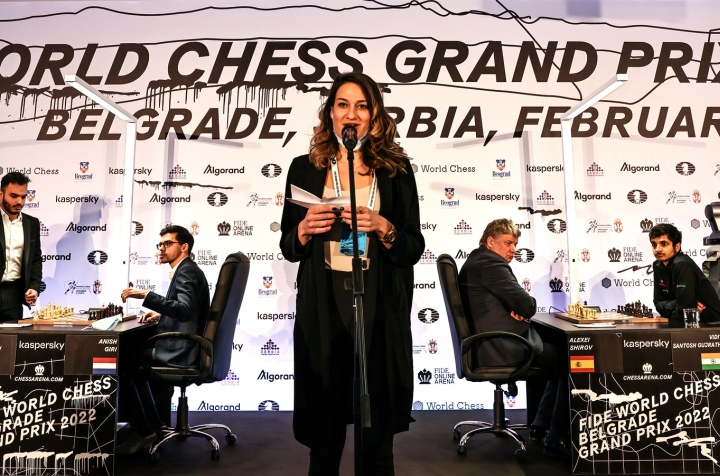A day of draws in the FIDE Grand Prix Belgrade organized by World Chess as Maxime Vachier-Lagrave is the only one to score a victory, producing a first decisive game in Pool D
The fourth round of the second leg of the FIDE Grand Prix was mostly calm as seven out of eight games ended in a draw. The only one to win was the World Blitz champion and seasoned top-class player, Maxime Vachier-Lagrave (MVL), who scored an important victory in Pool D, breaking a three-round long cycle of draws in that group.

In the overall results, Anish Giri is doing best with 3/5, leading Pool B, followed by five GMs on 2.5 points: Andreikin and Shankland (leaders in Pool A), Rapport and Gujrathi (leaders in Pool C) and MVL, who leads in Pool D.
Pool A:
The game between Dmitry Andreikin and Alexander Grischuk was the first to finish after an hour and 15 minutes of play. The two played a well-researched line in the Grunfeld Defence, and the game followed a familiar theoretical path leading to a draw. As Grischuk said – “Dmitry only checked if I knew the theory and it turns out I do”.
Dmitry Andreikin noted that he was happy with a draw given the overall standings as he prepares for the key duel in the group – the Round 5 encounter with the other leader of Pool A, Sam Shankland. Alexander Grischuk was more direct: “I can now buy a [plane] ticket, as it’s guaranteed I won’t reach the playoffs”.

In the other game in this group, Sam Shankland drew with Etienne Bacrot. White got a better position out of the opening but did not manage to coordinate his pieces and allowed Black to regroup. By move 14th White’s advantage melted. Then it was Etienne’s turn to misstep – his rook made a long voyage to b4, but it was just a waste of time. Sam achieved a virtually won position but failed to find 34.e5! He went for Black’s a-pawn, hoping to advance his a-runner, but Bacrot also had a pawn on c5, which played an important role in his defensive setup. In the end, the Frenchman gave up his knight for White’s a-runner to collect Shankland’s pawns on the kingside to secure a draw.
Pool B:
Nikita Vitiugov split a point with Pentala Harikrishna. In the Anti-Marshal, the two quickly achieved a balanced position. Although it was not without venom, neither side had any serious chances. Both opponents made very logical moves, and a draw came as a natural outcome.

Amin M. Tabatabaei and Anish Giri drew their round four game as well. The Rossolimo attack of the Sicilian was played, and both sides wanted to force the other out of their preparation, but neither succeeded.
After Black played 11…b5, Tabatabaei spent 15 minutes thinking about his response, but he didn’t manage to find anything sharp. Giri easily equalized, and the game moved towards calmer waters. After massive exchanges, the position transpired to a rook endgame, and the two agreed to split a point on the move 31.
Pool C:
Vladimir Fedoseev was eager to catch up with Richard Rapport, but the latter opted for a very solid Petroff Defense. The two followed a critical line in which the Hungarian introduced a novelty recommended by chess engines. After exchanges on the queenside, Vladimir managed to win a pawn, but Richard had two strong bishops as compensation. The position was even, and the two agreed to split a point on the move 42.

Alexei Shirov and Vidit Santosh Gujrathi played the longest game of the round (five and a half hours) before deciding to call it even. In the Open Variation Ruy Lopez, the opponents tested a very old line first played by the fifth World Champion Max Euwe in a couple of games back in 1920. The encounter played more than a century later did not change the evaluation of the position as safe for Black. The opponents ended up in a roughly equal endgame in which Shirov tested the precision of his opponent but to no avail. The game was drawn on move 57.

Pool D:
Shakhriyar Mamedyarov and Yu Yangyi drew their game. In the Ragozin Defence, Black solved all the opening problems and reached equality. Things shifted after White’s move 21.Rb2, allowing Black to get an edge after seemingly illogical knight exchange on d4. However, Yu either missed or underestimated a very strong move 22…b5 creating a protected b5-passer. As played, White avoided the worst, and after mutual annihilation of the weak pawns, the opponents split a point on the move 30.

The duel between Alexandr Predke and Maxime Vachier-Lagrave was the first one to produce a decisive outcome in Pool D after four rounds.
Vachier-Lagrave played a less common line in his trademarked Najdorf. In a sharp game where both players forced each other out of preparation, Predke was the first one to err, venturing upon a breakthrough in the center that did not work out for him.
The following middlegame was a typical complicated Scicilan battle: Maxime allowed White to exert pressure on the e-file, aiming for the uncastled king, but at the same time, he had enough resources to launch a counter-attack on the queenside.

It was all going Black’s way in this critical portion of the game as the Frenchman completely outplayed his opponent. On move 30 White had to give up an exchange, and the rest was a smooth sail for MVL. The Frenchman is now the leader of Group D.
Round 5
Saturday is a rest day at the FIDE Grand Prix. Round five will be played on Sunday, 6th March, from 3 PM local (CET) time.
The pairings for the fifth round are as follows:
Pool A:
Sam Shankland (2704) vs Dmitry Andreikin (2724)
Etienne Bacrot (2635) vs Alexander Grischuk (2758)
Pool B:
Amin M. Tabatabaei (2623) vs Nikita Vitiugov (2726)
Anish Giri (2771) vs Pentala Harikrishna (2716)
Pool C:
Alexei Shirov (2691) vs Vladimir Fedoseev (2704)
Vidit Santosh Gujrathi (2723) vs Richard Rapport (2762)
Pool D:
Alexandr Predke (2682) vs Shakhriyar Mamedyarov (2776)
Maxime Vachier-Lagrave (2761) vs Yu Yangyi (2713)
The FIDE Grand Prix Series is brought to you by World Chess.
Leading partners supporting the FIDE Grand Prix Series 2022 include:
Kaspersky as the Official Cybersecurity Partner;
Algorand as the Official Blockchain Partner;
Prytek as the Technology Transfer Partner;
FIDE Online Arena as the official Partner.
Text: Milan Dinic
Photo: Mark Livshitz
Official Photo FIDE Grand Prix Belgrade Press kit
About World Chess:
World Chess is a London-based chess gaming and entertainment group and FIDE’s official broadcaster and commercial partner. World Chess organized the FIDE Championship Matches in Russia, the USA, and the UK, and revolutionized the sport by signing the biggest media partnerships in history. World Chess develops Armageddon, the chess league for prime-time television. World Chess also runs FIDE Online Arena, the exclusive official chess gaming platform. More at worldchess.com.
About FIDE:
The International Chess Federation (FIDE) is the governing body of the sport of chess, and it regulates all international chess competitions. Constituted as a non-governmental institution, it was recognized by the International Olympic Committee as a Global Sporting Organization in 1999.
FIDE currently has its headquarters in Lausanne, but it was initially founded in 1924 in Paris under the motto “Gens una Sumus” (Latin for “We are one Family”). It was one of the very first International Sports Federations, alongside the governing bodies of the sports of Football, Cricket, Swimming, and Auto Racing. It is now one of the largest, encompassing 195 countries as affiliate members, in the form of National Chess Federations. Chess is nowadays a truly global sport, with dozens of millions of players in all the continents, and more than 60 million games on average played every day.
More information: www.fide.com
About Kaspersky
Kaspersky is a global cybersecurity and digital privacy company founded in 1997. Kaspersky’s deep threat intelligence and security expertise is constantly transforming into innovative security solutions and services to protect businesses, critical infrastructure, governments and consumers around the globe. The company’s comprehensive security portfolio includes leading endpoint protection and a number of specialized security solutions and services to fight sophisticated and evolving digital threats. Over 400 million users are protected by Kaspersky technologies and we help 240,000 corporate clients protect what matters most to them. Learn more at www.kaspersky.com.
About Algorand
Algorand is building the technology to power the Future of Finance (FutureFi), the convergence of traditional and decentralized models into a unified system that is inclusive, frictionless, and secure. Founded by Turing Award-winning cryptographerSilvio Micali, Algorand developed a blockchain infrastructure that offers the interoperability and capacity to handle the volume of transactions needed for defi, financial institutions and governments to smoothly transition into FutureFi. The technology of choice for more than 700 global organizations, Algorand is enabling the simple creation of next generation financial products, protocols and exchange of value. For more information, visit www.algorand.com.
About Prytek
The Prytek Group combines technology companies and services companies to create a new asset class. We build legacy service businesses and combine them with deep tech technologies to increase margins. We buy out entire operations and create efficiency and scalability through our technologies. The group is divided into a Corporate Arm – which comprises of controlled companies and an Investment Arm – which acts as a VC and PE fund of the Group. The goal of the Corporate Arm is to generate consolidated cash with a legacy vision, while the Investment Arm is to develop products for our operations and generate profit via equity value growth and exit at a high valuation.
Prytek Building Technologies, Delivering Managed Services. Prytek: www.prytek.com
About FIDE Online Arena
FIDE Online Arena is the exclusive online chess gaming platform that awards online ratings recognized by FIDE. It hosts rated tournaments and games 24 hours per day. The platform runs an advanced fairplay engine. Play official games at chessarena.com.







